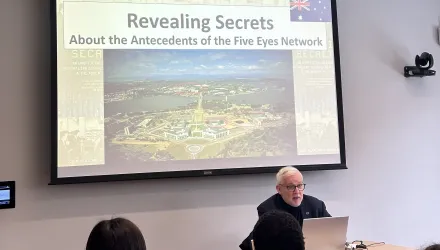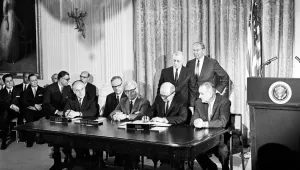As part of the USA Freedom Act, Congress yesterday passed key legislation that will finally permit U.S. ratification of two important treaties that strengthen international nuclear security. While the Senate gave its advice and consent for ratification of the 2005 amendment to the Convention on Physical Protection of Nuclear Materials (CPPNM) and the International Convention on the Suppression of Acts of Nuclear Terrorism (ICSANT) years ago, the treaties require parties to criminalize certain acts related to nuclear terrorism, so passage of implementing legislation was needed before the United States could ratify them. Failure to ratify these key treaties on nuclear security and nuclear terrorism before any of the first three nuclear security summits, when the United States was pushing the world to act on nuclear security, has been a substantial embarrassment.
The ICSANT, which entered into force in 2007, defines and criminalizes nuclear terrorism, and requires parties to “make every effort to adopt appropriate measures to ensure the physical protection of radioactive materials.” The 1980 CPPNM criminalizes nuclear theft and smuggling of nuclear material, gives all parties jurisdiction to prosecute such crimes, and sets very minimal standards for security of civilian material in international transport. The 2005 amendment to the CPPNM would extend the convention to also cover civilian materials in domestic use, storage, and transport, and to cover sabotage of nuclear facilities. While the amendment does not set specific standards for security for civilian nuclear material, it includes a list of fundamental principles of physical protection of nuclear materials based on International Atomic Energy Agency recommendations. The amendment was opened for signature in 2005. A decade later, and three years after the 2012 nuclear security summit called for bringing it into force in 2014, not enough parties to the CPPNM have ratified for it to enter into force – in part because of the U.S. failure to ratify.
These conventions are a modest positive step that bolsters international commitment to nuclear security. By ratifying, the United States sends an important message to the international community that commitments to nuclear security deserve the full weight of domestic and international law. U.S. ratification will help encourage other holdouts to ratify, strengthening international support for these conventions. It also builds momentum as the United States prepares for the 2016 Nuclear Security Summit, which is likely to be the last in the series of summits held every two years since 2010. Finally, today’s passage of implementation language suggests that, despite acrimony between political parties in the Congress, there still exists some consensus around the importance of nuclear security and preventing nuclear terrorism.
Passage of this legislation did not come quickly. Seven years went by from the time the United States first proposed amending the CPPNM to the time the amendment was opened for signature in 2005, and then another three years passed before the U.S. Senate provided its advice and consent for the amendment in 2008. The ICSANT, first proposed by Russia, was also opened for signature in 2005 and approved by the Senate in 2008. Congress could have passed the implementing language any time since the United States signed these conventions in 2005, but failed to do so until now – largely because of disputes over whether some of the crimes included would carry the death penalty. Remarkably, in this age of hyper-partisanship, it was the House of Representatives that worked out a bipartisan compromise and attached the language to the USA Freedom Act; while Senators Charles Grassley (R-OK) and Patrick Leahy (D-VT)—leaders of the Senate Judiciary Committee—were unable to compromise.
As part of its effort to strengthen global nuclear security, the Obama administration has maintained the goal of convincing as many countries as possible to sign and ratify these conventions. Since 2009, when the Obama administration announced that it would make nuclear security a priority, there has been remarkable progress on this front. Sixty-one of the 84 states that acceded to the CPPNM amendment by February 2015 had done so since 2009. Two-thirds of the 151 parties to the convention must ratify before it enters into force. Seven of the remaining countries that have not ratified— Belarus, Iran, Italy, North Korea, Pakistan, South Africa, and Syria—have nuclear weapons-usable material.
The ICSANT, which already entered into force, had, as of February 2015, been ratified by 99 countries, with 47 joining since 2009. Eight of those 47 countries— Argentina, Ghana, Iran, Israel, Italy, North Korea, Pakistan, and Syria— have nuclear weapons-usable material.
Roth, Nickolas. “Congress Gives Thumbs Up to International Nuclear Security Conventions.” June 3, 2015





